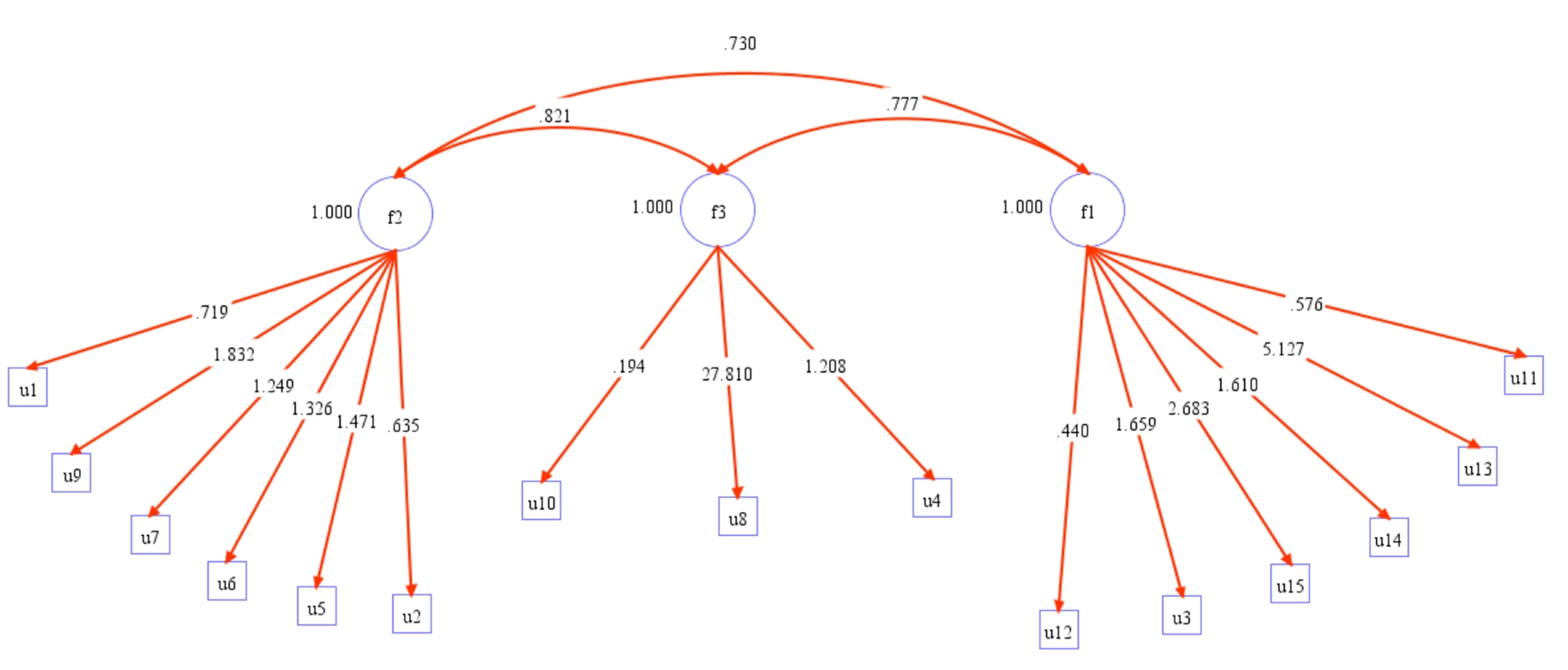Session Information
Date: Sunday, October 26, 2025
Title: (0067–0097) Rheumatoid Arthritis – Etiology and Pathogenesis Poster
Session Type: Poster Session A
Session Time: 10:30AM-12:30PM
Background/Purpose: Prevalence of depression in RA patients ranging from 10% to 25%, making it the most common psychiatric disorder in this population. The Plutchik Suicide Risk Scale is a tool validated in Colombia for assessing suicide risk. It consists of 15 items and evaluates aspects such as suicidal ideation, history of previous attempts, and emotional severity, with a cutoff score of 6 or higher indicating risk. Our Objectives were: To perform an exploratory factor analysis of the Plutchik Suicide Risk Scale in patients with rheumatoid arthritis, and to evaluate the correlation between this score and disease activity and quality of life scales. Additionally, to estimate the prevalence of suicide risk in our population with rheumatoid arthritis.
Methods: A cross-sectional study with ambispective data collection was conducted. Patients over 18 years of age with a diagnosis of rheumatoid arthritis, based on the 2010 ACR/EULAR criteria, and treated at the Rheumatology Department of the Hospital Universitario Clínica San Rafael in Bogotá were included. Patients with major depressive disorder, anxiety disorders, or neurocognitive disorders were excluded. To assess the correlation between the Plutchik scale and the DAS28, HAQ, and CDAI indices, Spearman’s correlation coefficient. For the confirmatory factor analysis (CFA), the weighted least squares means and variance adjusted (WLSMV) estimator was applied, as it is suitable for dichotomous items. A theoretical three-factor model was established, and factor loadings, standard errors, and p-values were calculated. Goodness-of-fit measures were then estimated: chi², TLI (Tucker-Lewis Index), CFI (Comparative Fit Index), SRMR (Standardized Root Mean Square Residual), and RMSEA (Root Mean Square Error of Approximation). The analysis was performed using MPLUS version 8.11 and RStudio version 4.3.2
Results: A total of 91 patients were included in the study, of whom 78% were women. The mean age was 54 years (±14), and the median disease duration was 60 months (120). The median DAS28 score was 3.5 (2.7), and CDAI score was 12 (14). Quality of life, assessed using the HAQ, showed a median score of 1.1 (IQR: 1.55). The Plutchik Suicide Risk Scale yielded a median score of 3 (4.5). When evaluating suicide risk using the Plutchik scale, 26.3% of our population was found to be at risk. Analysis of the correlation between this scale and disease activity scores showed no statistically significant associations with DAS28 or CDAI However, a significant correlation was observed between suicide risk and quality of life, as assessed by the HAQ (rho = 0.60; p < 0.001). The exploratory factor analysis supported a three-factor model, with statistically significant factor loadings for all items except for item P10: "Are you separated, divorced, or widowed?" which had an estimate of 0.19 and a p-value of 0.18. The goodness-of-fit indices indicated acceptable model fit: RMSEA = 0.07, CFI = 0.92, and TLI = 0.91.
Conclusion: The prevalence of suicide risk, according to the Plutchik scale, in our population was 26.3%. A statistically significant correlation was found between this scale and quality of life, demonstrating an acceptable performance of the Plutchik scale in patients with rheumatoid arthritis.
To cite this abstract in AMA style:
Quevedo P, mora J, garcia w, Solano a, Muñoz j, Lopez D. Confirmatory Factor Analysis of the Plutchik Suicide Risk Scale in Patients with Rheumatoid Arthritis [abstract]. Arthritis Rheumatol. 2025; 77 (suppl 9). https://acrabstracts.org/abstract/confirmatory-factor-analysis-of-the-plutchik-suicide-risk-scale-in-patients-with-rheumatoid-arthritis/. Accessed .« Back to ACR Convergence 2025
ACR Meeting Abstracts - https://acrabstracts.org/abstract/confirmatory-factor-analysis-of-the-plutchik-suicide-risk-scale-in-patients-with-rheumatoid-arthritis/

